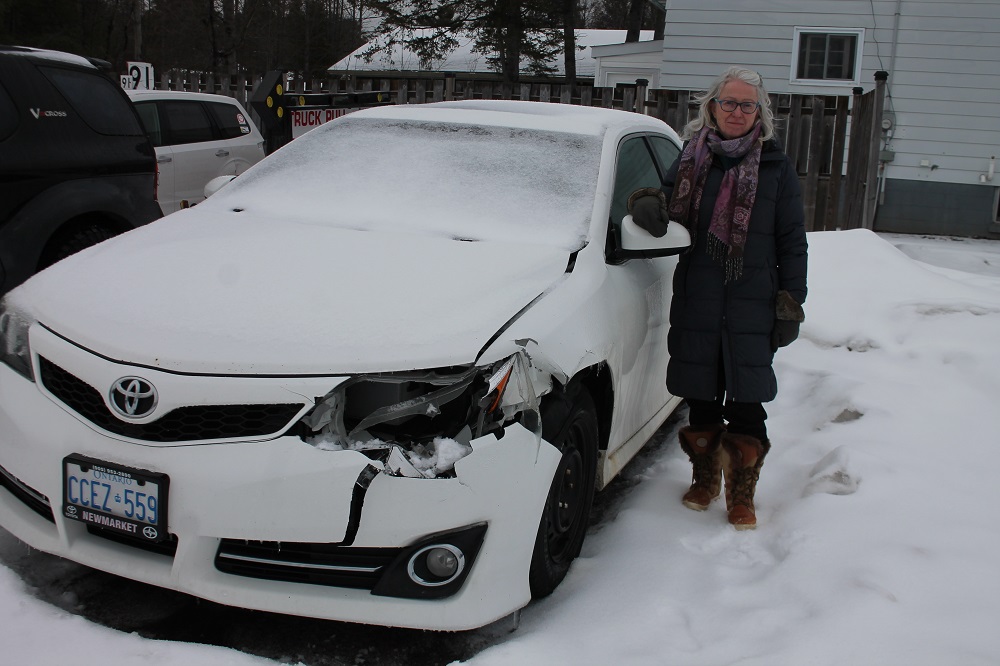Tracy Gualberto and husband John Sexton were heading home from the Minden Curling Club about 10 p.m. on a recent winter’s night.
Driving north on Hwy. 35 towards their home on Boshkung Lake, Gualberto said they were surprised to see a deer on the road in front of them at the Ransley Road intersection. Travelling at 80 km/h, it was impossible for them to brake in time to avoid a collision.
While the two were unhurt, and their 2013 Toyota Camry’s air bags did not deploy, the deer and the front end of the car did not fare as well. The deer was killed and the car suffered extensive damage and is now at Minden Collision awaiting repairs.
“At 10 p.m., we didn’t expect to have a deer in the middle of the road,” Gualberto said. She said they usually slow down in Haliburton village because they know people feed deer there and the animals are on, and near, roads.
Gualberto and Sexton called OPP and said the officer who responded told them it was the sixth such callout for a vehicle-deer collision in the same area over the past month or so.
The couple called friends who were still at the club, and live nearby on Kushog Lake, to see if they could pick them up since their car was being towed.
Gualberto said that couple then had a buck cross the road right in front of them and a second crash ensued in the same area. Again, the occupants of the vehicle were not injured but the vehicle and the animal were not so lucky.
Gualberto said she thinks the collisions were due to people feeding deer, which attract them to the area and cause them to cross the highway.
“Everyone wants to feed deer,” she said, “but they are actually killing them. They think they’re doing a kind thing, but they are not doing these deer any favours.”
The Highlander asked Haliburton Highlands OPP about vehicle-deer collisions in the area. They did a threeyear review of Hwy. 35, between Horseshoe Lake Road closest to Minden and Judge Jordan Road. Between Jan. 1, 2020 and Jan. 18, 2023, there were 34 deer-vehicle collisions. Nine were within 300m of the Ransley Road intersection. Forty-one per cent were between 5 and 7 p.m. They were primarily in December and January. There were no injuries but vehicles were damaged.
The Wolf Centre at Haliburton Forest is sometimes the recipient of deer killed in these collisions. The carcasses are used to feed the wolves.
“We do get a fair bit in the way of deer roadkill,” co-ordinator Marena Wigmore said. She added, “typically spring and fall are the peak times for it, but we have been getting some this winter as well with the minimal snow banks along the highways. Our local OPP and roads departments, as well as locals, are great about calling us when there has been a collision and some even bring the animal right to us.”
“We do get a fair bit in the way of deer roadkill,” co-ordinator Marena Wigmore said. She added, “typically spring and fall are the peak times for it, but we have been getting some this winter as well with the minimal snow banks along the highways. Our local OPP and roads departments, as well as locals, are great about calling us when there has been a collision and some even bring the animal right to us.”
The MNRF adds that feeding deer can make them dependent on artificial food sources; they can lose their natural fear of humans and pets, and become more prone to conflict; artificial feed is not healthy for them; animals concentrating to feed can spread parasites and diseases, and destroy natural habitat. They further say it puts people at risk as feeding can attract unwanted animals, animals can learn to associate humans with food and become problematic, and at times aggressive.
Household dos and don’ts:
Do:
• appreciate wildlife from a distance.
• keep household waste, compost and pet food out-of-reach from wild animals.
• attract wildlife to your property by improving natural habitat.
• work together with your neighbours to help keep wild animals wild.
Don’t
• put out food to attract wildlife.
• try to approach or touch wild animals.
• feed pets outdoors or allow pets to roam free.
• put garbage out until the morning of collection.
Source MNRF





